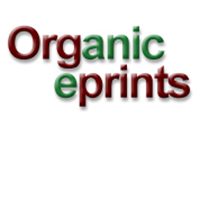Organic Eprints presented as best practice of open repositories
Allan Leck Jensen represented ICROFS at the 10th International Conference on Open Repositories in Indianapolis, Indiana, USA. The participants showed great interest in ICROFS’ subject specific repository Organic Eprints.

The conference addressed researchers as well as developers and managers of open repositories, such as Organic Eprints, with the objective to exchange ideas and experiences about open repositories.
When repositories are called ‘open’ it refers to openness in two aspects: Firstly, it refers to ‘open access’, i.e. that the content is freely accessible to users. Secondly, it also refers to ‘open source’, i.e. that developers can view and modify the source code of the repository management program. In this way, modules and improvements of the open repository platforms can be shared to the benefit of everyone.
The participants were very interested in learning more about Organic Eprints, as it was one of the only subject specific organic agriculture repositories among many institutional repositories on the conference.
Presentation of improvements in the EPrints platform
In the Interest Group for EPrints, Allan Leck Jensen presented the paper:
“Open Research Repositories for Organic Agriculture” by Ilse A. Rasmussen and Allan Leck Jensen.
This paper focuses on some of the changes that ICROFS has made in the EPrints platform to improve Organic Eprints. The main improvements presented were concerned with:
- Organisational structure:
Organic Eprints is a cross-institutional repository with distribution of editorial responsibility to 26 national editors - Vocabulary:
Organic Eprints is in the process of integrating a third-party vocabulary (AGROVOC by FAO), so that when implemented, eprints can be searched with keywords in up to 23 languages - OpenAire compliant:
Organic Eprints has been made compliant to OpenAire, which makes it possible to search for documents across OpenAire compliant repositories. EU demands that publications of EU-funded projects are deposited in Open Access archives, and this is easily fulfilled by depositing the project publications in Organic Eprints.
More about the conference
The OR2015 conference was organized with one day of workshops, two days of general conference and one day of sessions for special interest groups. The participation in the conference was as an excellent opportunity to get in contact with fellow repository developers, especially people involved with the development of the EPrints platform.

Networking at the conference